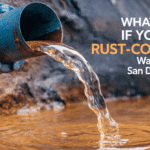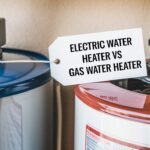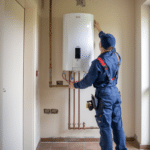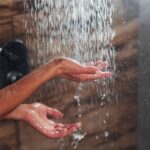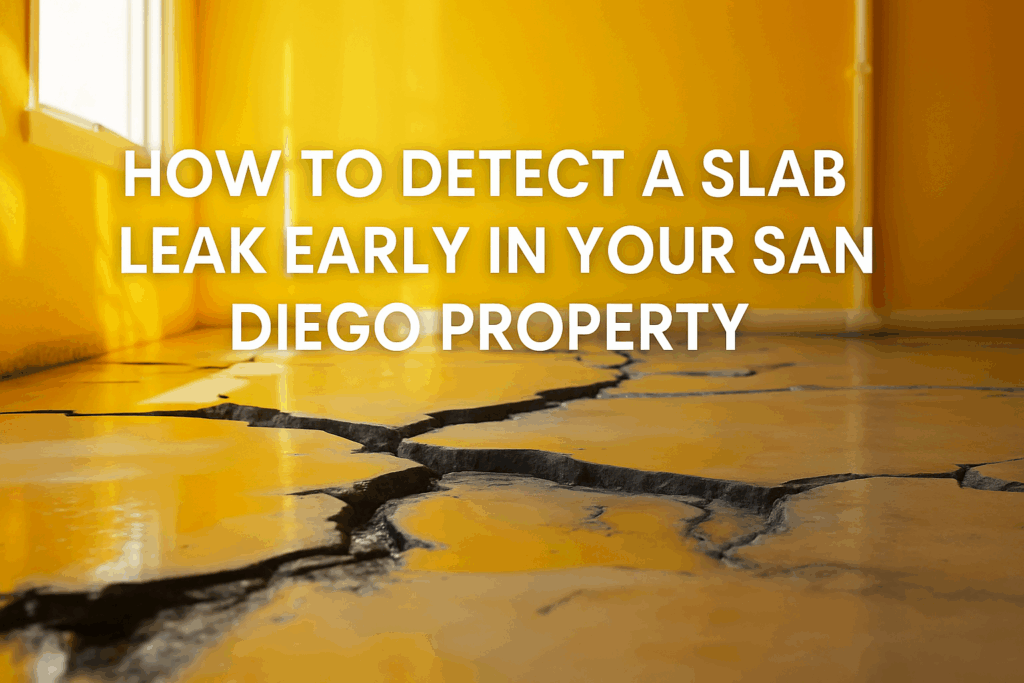
Table of Contents
- Key Takeaways
- What Is a Slab Leak?
- Common Causes of Slab Leaks in San Diego
- Early Warning Signs You Might Have a Slab Leak
- How to Confirm a Slab Leak
- Why Early Detection Matters
- Slab Leak Detection You Can Rely On in San Diego
A slab leak isn’t always obvious—until it becomes a serious problem. For many San Diego homeowners, what starts as a minor nuisance can quietly grow into major water damage and costly repairs.
Catching the signs early can save you time, money, and stress. At Voyager Plumbing, we’ve seen how early detection makes all the difference. We’ll walk you through what a slab leak is, how to spot the early warning signs, and when it’s time to call in the pros.
If you suspect a leak or want expert help fast, contact us today. We’re ready to take your call.
Key Takeaways
- A slab leak occurs when a pipe beneath your concrete foundation leaks—often going unnoticed until damage appears inside your home.
- San Diego homes are especially at risk due to shifting soil, hard water corrosion, and aging plumbing infrastructure.
- Early warning signs include unexplained water bills, warm floor spots, damp flooring, musty smells, low pressure, and wall or floor cracks.
- Use your water meter as an initial check, but rely on a professional plumber for accurate detection using listening devices, thermal cameras, and pressure testing.
- Early detection reduces damage and repair costs, helping you avoid structural issues, water damage, and mold growth.
- If you suspect a slab leak, don’t wait—get a trusted local plumbing expert involved as soon as possible.
What Is a Slab Leak?
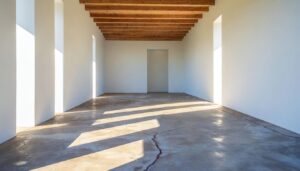 A slab leak occurs when a water pipe beneath your concrete foundation cracks, breaks, or erodes. These issues usually involve pressurized water lines, and they often remain hidden until damage becomes noticeable inside your home.
A slab leak occurs when a water pipe beneath your concrete foundation cracks, breaks, or erodes. These issues usually involve pressurized water lines, and they often remain hidden until damage becomes noticeable inside your home.
Because the pipe is buried under solid concrete, water can escape undetected for days or even weeks. By the time visible signs appear, water may have already compromised your flooring, walls, or the foundation itself.
Common Causes of Slab Leaks in San Diego
San Diego homes are especially prone to slab leaks due to a combination of soil conditions, water quality, and aging infrastructure.
Here are some common causes we encounter:
- Corrosion: Over time, minerals in the water can wear down older copper pipes.
- Soil Pressure: As the soil expands or shifts, it can apply force to underground pipes, causing fractures.
- Poor Installation: Pipes damaged or improperly installed during construction may fail prematurely.
- Abrasion: Pipes that rub against concrete or rebar due to vibration or movement can eventually wear thin and rupture.
Why Slab Leaks Are a Bigger Deal in San Diego
In areas like San Diego where slab foundations are common, a leak doesn’t drain into a crawl space—it gets trapped under the slab. That trapped moisture can lead to pooling, structural stress, and long-term foundation damage. San Diego’s hard water also accelerates corrosion, putting older plumbing systems at higher risk.
Early Warning Signs You Might Have a Slab Leak
Catching a slab leak early depends on recognizing subtle changes in your home. Here’s what to watch for:
1. Unexplained Water Bills
If your water bill suddenly climbs without a change in usage, it could be due to water leaking below your foundation.
2. Warm Spots on the Floor
Unusual warm areas on tile or hardwood flooring, especially in open spaces, often indicate a leak in a hot water line beneath the slab.
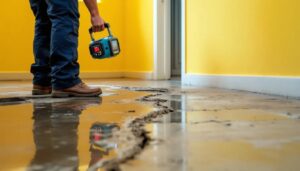 3. Water Stains or Damp Floors
3. Water Stains or Damp Floors
Stains or damp spots on floors and baseboards that don’t seem to come from plumbing fixtures may be caused by rising moisture from under the foundation.
4. Mold or Mildew Smell
A musty smell, especially in rooms without plumbing fixtures, could signal hidden moisture from an underground leak.
5. Low Water Pressure
If faucets and showerheads seem weaker than usual, water may be escaping from your pipes before it reaches its destination.
6. Cracks in Walls or Flooring
Hairline cracks in drywall, tile, or flooring may be caused by slab movement from an active leak. While cracking can have many causes, it becomes more concerning when paired with other leak symptoms.
How to Confirm a Slab Leak
If you notice any of these signs, don’t wait. Here’s what to do next:
- Check Your Water Meter: Turn off all fixtures in your home. If the meter still moves, you may have a leak.
- Call a Professional: At Voyager Plumbing, we use advanced tools to locate slab leaks without unnecessary damage to your home.
What Leak Detection Looks Like Today
Modern tools allow us to find slab leaks quickly and precisely. Here’s how we do it:
- Electronic Listening Equipment: Amplifies the sound of water escaping from pressurized lines.
- Thermal Imaging Cameras: Detect subtle temperature changes in your floor, especially helpful for hot water leaks.
- Pressure Testing: Helps identify pressure loss in plumbing lines that may indicate an active underground leak.
These tools reduce the need for guesswork and minimize damage during repairs.
Why Early Detection Matters
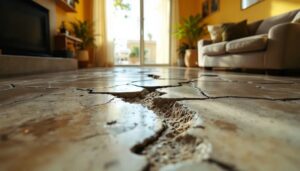 Waiting to deal with a slab leak often leads to more damage and higher costs.
Waiting to deal with a slab leak often leads to more damage and higher costs.
Here’s what’s at risk:
- Water-damaged flooring and baseboards
- Foundation weakening or shifting
- Mold growth inside walls and flooring
- Larger repair bills due to long-term water exposure
Spotting a slab leak early makes the repair process faster, easier, and less expensive. It also helps you protect the structure and value of your property.
Slab Leak Detection You Can Rely On in San Diego
If you think you have a slab leak—or even just suspect something might be wrong—Voyager Plumbing is here to help. We bring decades of hands-on experience in San Diego homes, and we use the latest detection methods to identify leaks accurately without tearing up your floors.
Our team is easy to reach, quick to respond, and committed to clear communication and honest pricing. Whether you’re dealing with an emergency or just want peace of mind, we’re ready when you are.
Call us today or request an appointment online. Catch a slab leak early—and stop the damage before it starts.




